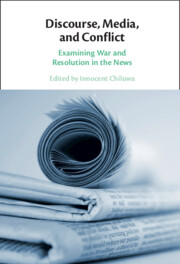Book contents
- Discourse, Media, and Conflict
- Discourse, Media, and Conflict
- Copyright page
- Contents
- Figures
- Tables
- About the Authors
- Foreword
- Introduction
- Part I Conflict Discourse in Newspaper Reporting
- 1 Elián González in the New York Times
- 2 The Construction of Threat of “Islamist Terrorism” in German Newspapers
- 3 “Herdsmen Are Terrorists”
- 4 Covering the War on Iraq
- Part II Electronic Media and Online Discourses of Conflict
- Part III Media Discourse and Conflict Resolution
- Index
- References
1 - Elián González in the New York Times
Media Roles in the Trajectories of International Conflict
from Part I - Conflict Discourse in Newspaper Reporting
Published online by Cambridge University Press: 21 April 2022
- Discourse, Media, and Conflict
- Discourse, Media, and Conflict
- Copyright page
- Contents
- Figures
- Tables
- About the Authors
- Foreword
- Introduction
- Part I Conflict Discourse in Newspaper Reporting
- 1 Elián González in the New York Times
- 2 The Construction of Threat of “Islamist Terrorism” in German Newspapers
- 3 “Herdsmen Are Terrorists”
- 4 Covering the War on Iraq
- Part II Electronic Media and Online Discourses of Conflict
- Part III Media Discourse and Conflict Resolution
- Index
- References
Summary
This chapter examines the New York Times’ representation of the Elián González custody case in 1999 within the broader context of the conflict between the United States and Cuba. The central question that frames this work is the extent to which the ideas that underpin the conflict can be shown to influence the Times’ coverage of this specific episode – i.e., the extent to which the coverage of an episode can be influential on the broader conflict. The results point to support for the hypotheses that the discourses represented by the New York Times in its coverage of the González case corresponded with the themes of the broader conflict between the United States and Cuba and that American sources represented in the coverage exemplified predictable attitudes about Cuba and Communism.
- Type
- Chapter
- Information
- Discourse, Media, and ConflictExamining War and Resolution in the News, pp. 19 - 46Publisher: Cambridge University PressPrint publication year: 2022

